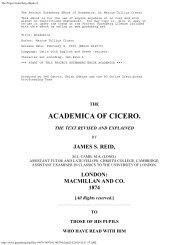From Farm House to the White House - 912 Freedom Library
From Farm House to the White House - 912 Freedom Library
From Farm House to the White House - 912 Freedom Library
You also want an ePaper? Increase the reach of your titles
YUMPU automatically turns print PDFs into web optimized ePapers that Google loves.
<strong>Farm</strong> <strong>House</strong> <strong>to</strong> <strong>the</strong> <strong>White</strong> <strong>House</strong>, by William M. Thayer 208<br />
as in o<strong>the</strong>r things, and actuated by that fervent love <strong>to</strong>wards it which is so natural <strong>to</strong> a man who views in it <strong>the</strong><br />
native soil of himself and his progeni<strong>to</strong>rs for several generations, I anticipate with pleasing expectation that<br />
retreat, in which I promise myself <strong>to</strong> realize, without alloy, <strong>the</strong> sweet enjoyment of partaking, in <strong>the</strong> midst of<br />
my fellow citizens, <strong>the</strong> benign influence of good laws under a free government--<strong>the</strong> ever favorite object of my<br />
heart, and <strong>the</strong> happy reward, as I trust, of our mutual cares, labors, and dangers.<br />
GEORGE WASHINGTON.<br />
On closing his presidential career, March 4, 1797, Washing<strong>to</strong>n retired <strong>to</strong> Mount Vernon, <strong>to</strong> spend <strong>the</strong> remnant<br />
of his days in retirement. It was not long, however, before <strong>the</strong> prospect of a war with France prompted <strong>the</strong><br />
nation <strong>to</strong> ask him <strong>to</strong> take command of its armies, <strong>to</strong> which he consented, although he declared that <strong>the</strong>re would<br />
be no war--a conclusion which subsequent events fully justified. John Adams was president, and he wrote <strong>to</strong><br />
Washing<strong>to</strong>n:<br />
"We must have your name, if you will in any case permit us <strong>to</strong> use it. There will be more efficacy in it than in<br />
many an army."<br />
Having said nothing particularly concerning Washing<strong>to</strong>n as a slave-holder, we may add, in closing this<br />
chapter, that he believed, with Jefferson, that slavery was a cruel wrong, and ought <strong>to</strong> be abolished. He said <strong>to</strong><br />
Jefferson, before he was president:<br />
"I never mean, unless some particular circumstances should compel me <strong>to</strong> it, <strong>to</strong> possess ano<strong>the</strong>r slave by<br />
purchase; it being among my first wishes <strong>to</strong> see some plan adopted by which slavery in this country may be<br />
abolished by law." In ano<strong>the</strong>r letter he says, "I can only say <strong>the</strong>re is not a man living who wishes more<br />
sincerely than I do <strong>to</strong> see a plan adopted for <strong>the</strong> abolition of it; but <strong>the</strong>re is only one proper and effectual mode<br />
by which it can be accomplished, and that is by legislative authority, and this, as far as my suffrage will go,<br />
shall never be wanting."<br />
During his presidency in New York, Mrs. Washing<strong>to</strong>n's favorite maid Ovey ran away, and she besought her<br />
husband <strong>to</strong> take measures <strong>to</strong> find her. Laughing, Washing<strong>to</strong>n replied:<br />
"I, who have been fighting for liberty, would appear finely in pursuit of a runaway slave!"<br />
He freely expressed his abhorrence of slavery <strong>to</strong> Lafayette during <strong>the</strong> war; and when <strong>the</strong> latter purchased an<br />
estate in Cayenne, with <strong>the</strong> intention of freeing <strong>the</strong> slaves upon it, Washing<strong>to</strong>n wrote <strong>to</strong> him:<br />
"Your late purchase is a generous and noble proof of your humanity. Would <strong>to</strong> God a like spirit might diffuse<br />
itself generally in <strong>the</strong> minds of <strong>the</strong> people of this country!"<br />
His will provided for <strong>the</strong> emancipation of his slaves, so far as possible. "Under <strong>the</strong> tenure by which <strong>the</strong> dower<br />
negroes are held he could not manumit <strong>the</strong>m." But <strong>the</strong> will ran thus:<br />
"Upon <strong>the</strong> decease of my wife, it is my will and desire that all <strong>the</strong> slaves whom I hold in my own right shall<br />
receive <strong>the</strong>ir freedom."<br />
After his death, Mrs. Washing<strong>to</strong>n proceeded <strong>to</strong> emancipate <strong>the</strong> slaves, agreeable <strong>to</strong> his wishes, at expressed in<br />
his last "will and testament."<br />
XXIV.<br />
DEATH, AND FUNERAL CEREMONIES.















